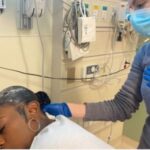
Source: joSon / Getty
In 2019, I wrote about a young woman who after nine years of wearing her hair natural, had a change of heart and put a relaxer in her hair. She did so because of a struggle to manage hair care needs with her busy schedule, and feeling as though “a messy bun is just not going to cut it” in her professional work environment. There were some who at the time commented that they found themselves feeling the same way. Their natural hair was a bit more complicated than they’d hoped it would be and they were considering going back to relaxers. Some people have talked about wearing their own hair but putting chemicals on their edges for a smoother look. Even rapper Nicki Minaj, who has showcased her long natural hair in the past, asked her fans in November if she should put a relaxer in her hair to get it to her desired length, which was to her butt.
Wherever you stand on relaxers in this day and age, people are still talking about them in one way or another. And while we know the stance is either “what’s the big deal?” or a strong rebuke from a number of naturals, what do the experts say? Asking dermatologist Dr. Yolanda Lenzy, who has so graciously worked with us to get hair questions answered, she said that when it comes to relaxers in 2021, it’s all about the health of your own hair and how one goes about applying such chemicals to it.
“In general, because I specialize in a lot of hair and scalp conditions, for those individuals, I generally recommend to avoid unnecessary chemicals because relaxers have been…it’s controversial,” she says. “Some of the studies show that it has been associated and some studies show no association between relaxers and certain forms of scarring alopecia.”
Central centrifugal cicatricial alopecia is what she’s referring to. As Dr. Lenzy says, there has been no definitive answer as to whether or not relaxers play a part in that as some studies have shown no correlation while others have been associated with it or have shown to worsen the condition. She says though that if you’re considering getting a relaxer but have some doubts, then it’s not the move for you and you should try alternatives to obtain straight hair.
“In general, I say when in doubt, leave it out. Because you can achieve the results that a relaxer can give you in other ways,” she says. “If you want your hair straight, you can have a silk press done. That’s not without side effects. You can get heat damage and straight pieces that won’t revert. But I would say that’s probably safer, especially if you have a scalp condition and been doing a chemical.”
But she’s not completely against such chemicals, saying that when done right, you can still have healthy hair with a relaxer. They’re just not a recommendation she would offer outright.
“I have a lot of patients who have relaxed hair and it’s healthy,” she says. “Generally, I recommend having it done by a professional and not doing it too frequently. So a mild strength every three months, because people used to do relaxers every four to six weeks. I think that’s much too frequent. So for people who do choose to relax, those are the caveats. Because there are people who have relaxed hair that’s healthy. So it’s just not to say that all natural hair is healthy and all relaxed hair is damaged. That’s not true. But in the spirit of prevention and because these studies exist that these chemicals can possibly cause other untoward effects, I recommend going without it unless you feel absolutely strong.”
“I have patients that say, ‘For me, for my manageability, this works better for me.’ But probably about 95 percent of patients I know are not relaxing anymore,” she added. “Once they convert, they’re like ‘Oh my God my hair’s so much thicker and healthier’ in terms of the goals they’re trying to work on with me. It works much better because when the hair in its curlier state it’s going to camouflage thinning. I’ve had patients in the past who got a relaxer and they’re like, “Oh my God all my hair just came out.” It’s because it’s straighter that you can see through to the scalp. So if you’re already having thinning and you get your hair bone straight, you’re going to see the scalp much more easily than if you’re wearing it in a textured, curlier style. That volume helps to really camouflage the thinning.”
So if you’re one of those people talking about what’s manageable for you and struggle with your own strands, a relaxer is an option. However, there are much healthier choices to try first.
“I think things can be done safely in the right hands. But like I said, when in doubt, leave it out,” Dr. Lenzy says. “I prefer to work with your natural hair and you can achieve different style options. If you want to achieve a style, I would recommend doing that with light heat than doing that with a chemical relaxer on a consistent basis.”


